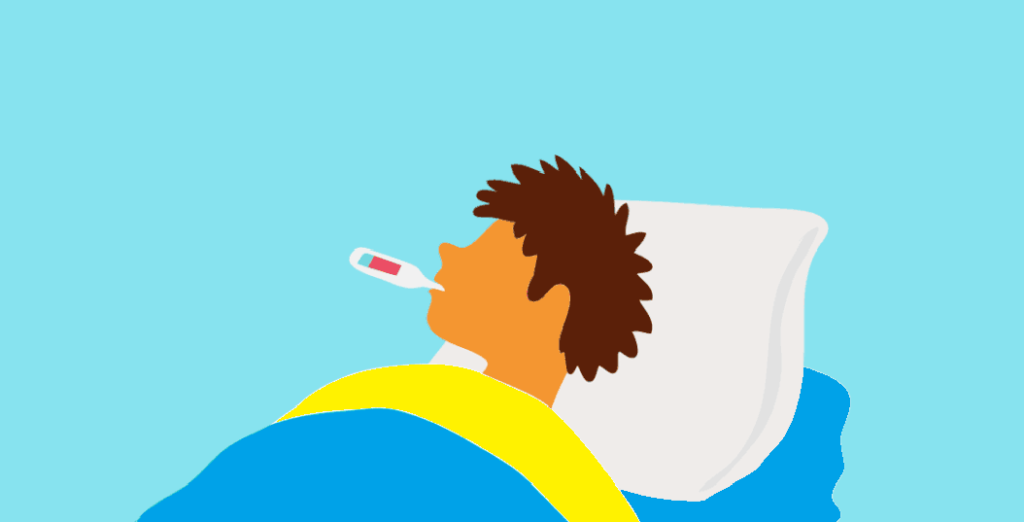Influenza or “the flu” is a contagious respiratory illness caused by influenza viruses that infect the nose, throat, and sometimes the lungs. It can cause mild to severe illness, and at times can lead to death.
Signs and Symptoms of Flu
People who have the flu often feel some or all of these signs and symptoms that usually start suddenly, not gradually:
- Fever* or feeling feverish/chills
- Cough
- Sore throat
- Runny or stuffy nose
- Muscle or body aches
- Headaches
- Fatigue (very tired)
- Some people may have vomiting and diarrhea, though this is more common in young children than in adults.
*It’s important to note that not everyone with flu will have a fever.
How Flu Spreads
Most experts believe that flu viruses spread mainly by tiny droplets made when people with flu cough, sneeze or talk. These droplets can land in the mouths or noses of people who are nearby. Less often, a person might also get flu by touching a surface or object that has flu virus on it and then touching their own mouth, nose, or possibly their eyes.
Period of Contagiousness
You may be able to pass on the flu to someone else before you know you are sick, as well as while you are sick. Although people with the flu are most contagious in the first 3-4 days after their illness begins, some otherwise healthy adults may be able to infect others beginning 1 day before symptoms develop and up to 5 to 7 days after becoming sick. Some people, especially young children and people with weakened immune systems, might be able to infect others with flu viruses for an even longer time.
Onset of Symptoms
The time from when a person is exposed to flu virus and infected to when symptoms begin is about 1 to 4 days, with an average of about 2 days.
Complications of Flu
Complications of flu can include bacterial pneumonia, ear infections, sinus infections, and worsening of chronic medical conditions, such as congestive heart failure, asthma, or diabetes.
People at High Risk from Flu
Anyone can get the flu (even healthy people), and serious problems related to the flu can happen at any age, but some people are at high risk of developing serious flu-related complications if they get sick. This includes people 65 years and older, people of any age with certain chronic medical conditions (such as asthma, diabetes, or heart disease), pregnant women, and young children.
Preventing Seasonal Flu
The first and most important step in preventing flu is to get a flu vaccination each year but you can still get the flu even if you’re vigilant about getting the vaccine.
The flu shot doesn’t contain the live flu viruses. It contains either inactivated viruses or particles that look a lot like the flu to your immune system, according to the Centers for Disease Control and Prevention (CDC). These ingredients prompt your body to develop new antibodies that will protect you if you do come in contact with a real, active flu virus.
Here’s the catch: The viruses that cause the flu are always changing. Every year, scientists try to design the flu vaccine so that it matches the actual flu viruses that are circulating in communities, the CDC reports. But since the viruses are a moving target, the vaccine isn’t perfect.
CDC also recommends everyday preventive actions (like staying away from people who are sick, covering coughs and sneezes and frequent handwashing) to help slow the spread of germs that cause respiratory (nose, throat, and lungs) illnesses, like flu.
Diagnosing Flu
It is very difficult to distinguish the flu from other viral or bacterial causes of respiratory illnesses on the basis of symptoms alone. There are tests available to diagnose flu.
Treating Flu
Drink plenty of liquids. Choose water, juice and warm soups to prevent dehydration.
Rest. Get more sleep to help your immune system fight infection.
Consider pain relievers. Use an over-the-counter pain reliever, such as acetaminophen (Tylenol, others) or ibuprofen (Advil, Motrin IB, others), to combat the achiness associated with influenza. Don’t give aspirin to children or teens because of the risk of Reye’s syndrome, a rare but potentially fatal condition.
But in some cases, your doctor may prescribe an antiviral drug.

